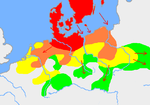The preterite or preterit (/ˈprɛtərɪt/ PRET-ər-it; abbreviated PRET or PRT) is a grammatical tense or verb form serving to denote events that took place...
24 KB (2,439 words) - 08:55, 30 October 2024
Germanic verbs (redirect from Preterite-present verb)
tenses: present (also conveying future meaning) and past (sometimes called "preterite" and conveying the meaning of all of the following English forms: "I did...
29 KB (2,932 words) - 18:29, 22 October 2024
lack of a preterite (see its etymology below) means that it neither passes nor fails one of the criteria Even for lexical verbs, preterite forms have...
81 KB (9,927 words) - 12:23, 21 October 2024
Go (verb) (section Development of a new preterite)
verb except be, the preterite (simple past tense) of go is not etymologically related to its infinitive. Instead, the preterite of go, went, descends...
11 KB (1,278 words) - 16:19, 20 March 2024
Aspect: perfective or imperfective (distinguished only in the past tense as preterite and imperfect) Voice: active or passive The modern Spanish verb paradigm...
79 KB (10,121 words) - 06:01, 24 September 2024
Middle High German verbs (section Preterite-presents)
upon the formation of the preterite: strong and weak. Strong verbs exhibit an alternation of the stem vowel in the preterite and past participle (called...
15 KB (1,676 words) - 01:55, 4 July 2024
Komi grammar (section Preterite I)
tenses in Komi which use a preterite form of the main verb and a preterite form of the auxiliary verb 'to be'. The Komi preterite III makes use of the main...
25 KB (1,479 words) - 05:07, 23 January 2024
preterite: gaf; English: infinitive: (to) give, preterite: gave; German: infinitive: geben, preterite: gab; Icelandic: infinitive: gefa, preterite: gaf;...
91 KB (10,144 words) - 13:48, 23 October 2024
All e-verbs (with -de in preterite) and j-verbs get the following inflections: All other e-verbs (those with -te in preterite) get the following inflections:...
67 KB (6,452 words) - 11:06, 26 October 2024
Apophasis (redirect from Preterition)
paralepsis – or occupatio or occultatio, and known also as praeteritio, preterition, or parasiopesis (παρασιώπησις). As a rhetorical device, apophasis can...
13 KB (1,419 words) - 23:03, 11 October 2024
vowels of the singular and plural preterite forms. The new uniform preterite could be based on the vowel of the old preterite singular, on the old plural,...
131 KB (12,182 words) - 03:53, 28 October 2024
English has two primary tenses, past (preterite) and non-past. The preterite is inflected by using the preterite form of the verb, which for the regular...
228 KB (23,161 words) - 16:15, 4 November 2024
Principal parts (section Preterite-present verb)
verbs, the principal parts of all other English verbs are the infinitive, preterite and past participle. All forms of these English verbs can be derived from...
24 KB (1,994 words) - 17:46, 22 October 2024
Proto-Celtic language (section Preterite formations)
or three major preterite formations in Proto-Celtic, plus another moribund type. The s-preterite The reduplicated suffixless preterite (originating from...
84 KB (5,182 words) - 01:14, 1 November 2024
singular preterite tense form comí ("I ate"); the single suffix -í represents both the features of first-person singular agreement and preterite tense,...
10 KB (1,091 words) - 08:13, 31 July 2024
and Finnish, also have a past tense. In English, the past tense (or preterite) is one of the inflected forms of a verb. The past tense of regular verbs...
20 KB (2,781 words) - 00:16, 17 April 2024
Old Irish grammar (section Preterite active stem types)
stem: forms the future Preterite active stem: forms the active preterite forms Preterite passive stem: forms the passive preterite forms Reduplication in...
124 KB (10,920 words) - 18:06, 25 June 2024
passive* Six morphological forms for tenses, aspects, and/or moods—present, preterite, imperfect, pluperfect, future, and conditional. Three (or four) moods—indicative...
44 KB (1,400 words) - 15:23, 18 June 2024
case of Swedish, the preterite will have a distinct vowel pattern in comparison to the past participle, specifically the preterite. An example of this...
10 KB (1,384 words) - 16:48, 7 September 2024
Proto-Tocharian language (section Preterite)
optative and preterite endings for the imperfect, while Tocharian B uses the same endings for both, which are a combination of preterite and unique endings...
47 KB (5,284 words) - 23:27, 5 September 2024
as irregularities. The examples are several forms of otherwise regular preterites: Stress mark on stressed i after a, e or o: caer > caímos (-caer), leer...
39 KB (3,467 words) - 15:32, 29 October 2024
Tocharian languages (section Preterite)
optative and preterite endings for the imperfect, while Tocharian B uses the same endings for both, which are a combination of preterite and unique endings...
77 KB (7,391 words) - 17:11, 1 November 2024
Old Saxon grammar (section Preterite-present verbs)
second preterite have identical stems, usually in io (occ. ē), and the infinitive and the past participle also have the same stem. The first preterite stem...
36 KB (2,227 words) - 15:18, 4 July 2024
often conveys reported speech; subjunctive plus preterite marks the conditional state; and the preterite alone shows either plain indicative (in the past)...
143 KB (14,311 words) - 01:22, 4 November 2024
This article uses the IPA to transcribe Irish. Readers familiar with other conventions may wish to see Help:IPA/Irish for a comparison of the IPA system...
22 KB (1,951 words) - 06:01, 4 November 2024
relevant Wiktionary entry. This is followed by the simple past tense (preterite), and then the past participle. If there are irregular present tense forms...
61 KB (1,124 words) - 15:20, 1 November 2024
Spanish grammar (section Preterite)
single word, rather than being compound verbs) are the preterite and the imperfect. The preterite is used to express actions or events that took place in...
67 KB (7,724 words) - 06:17, 27 October 2024
Occitan -atz, -etz, -itz. One feature of Catalan is the periphrastic preterite tense for referring to the remote past, which is constructed with characteristic...
72 KB (2,934 words) - 09:43, 26 September 2024
In most cases, the irregularity concerns the past tense (also called preterite) or the past participle. The other inflected parts of the verb – the third...
38 KB (4,870 words) - 01:30, 24 October 2024
Gilaki language (section Preterite)
Gilaki (گیلٚکي زٚوؤن romanized: Gilɵki Zɵvon) is an Iranian language belonging to the Caspian subgroup of the Northwestern branch, spoken in south of Caspian...
23 KB (1,825 words) - 02:11, 20 September 2024








